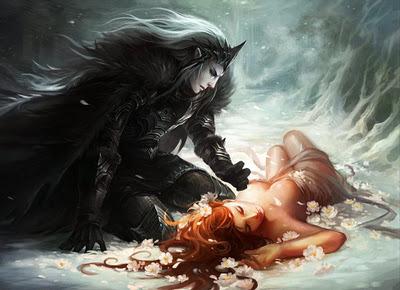I Always Mistrusted His Appearance of Goodness
 "Whosoever is overcome of desire and turns his gaze upon the darkness, he shall look on hell
"Whosoever is overcome of desire and turns his gaze upon the darkness, he shall look on helland lose the thing he loves."
After a brief discussion between my sister and me, Abigail wrote down a good post on romance in literature. I highly recommend it, because it bears considering, and I will only summarize it by saying that she holds (as the evidence supports) that romance can be written wrongly, but that there is no one right way to do it. But let her post speak for itself. In light of that brief discussion, her post, and my own novel, we thought I ought to write a companion post on the wrong sort of romance.
Don't misunderstand me. Abigail handled romance being written right and romance being written wrong. I want to wrestle with the beast of writing, not Romance Wrong, but Wrong Romance. We are all familiar with the girl who makes some bad calls and falls for the wrong sorts of men - we hope that, in the course of the story, she learns from her mistakes and finds a good bloke to look after her. But just as it is important to know how to write villains convincingly, flesh-and-bloodly, it is important to know how to write those bad calls, those wrong romances.
Two examples came to my mind, both of them very similar. In fact, it was this idea that brought the similarity to my attention. Those examples are my own heroine and antagonist (not very well known to you just yet) and the famous example of Hades and Persephone. Now, there was a match made in hell if ever there was one. You'll find the story of the kidnapped princess everywhere, of course, but Hades is really master of them all. Riding in his chariot pulled by his fell black horses, he comes upon the flower goddess wandering a little too far from home. In one swoop he grabs her by the wrist and hauls her into his car, whips up the horses, and plunges irreparably back into his abysmal realm. It's a well-known story. But they tell me familiarity breeds contempt, and it has been such a very long time since those black horses pricked through the meadow, leaving dead flowers in their wake, that the whole story doesn't really catch us by the throat anymore. We know how it ends, even if we hate Hades for doing it. It's boring. It has no dimension anymore, warped out of life by the sheer volume of time that lies between it and us.
So how, without violating moral laws that we all hold to be self-evident, do you catch your reader by the throat? How do you write such a persistent, unswerving, inexorable passion on the part of the antagonist, or the heroine fighting him every step and turn of the way? How do you make Hades and Persephone (who only wept, stupid woman; I would have kicked and bitten him on that downward drive) - how do you make Hades and Persephone real?
You're not allowed to be missish. My antagonist really does love the heroine, but in a twisted, dark, self-centred kind of way that shows a horrible kind of mercy and a hard kind of tenderness. Just as a villain won't consciously think "I am going to do this because I think it is wrong," just so a passionate antagonist will not try to woo a woman just to hurt her. Somehow, in some confused, fallen, violent way, there is something like attraction and love in the antagonist. And it is when something good is so totally warped out of decency that it really jolts you. Margaret and her suitor, far more than Hades and Persephone, make you fear for life and limb and light because the suitor stands closer to the attention than distant mythical gods, and he really means business.
You all know how to write good characters. You know how to give them dimension, depth, purpose. You know how to make a really good hero and a really good villain. But I'm throwing another ball into the cricket match (because doesn't this all defy explanation?), and that is the depraved romance. That, too, is a fact, and that, too, as with everything else, is something we ought to be able to handle well. And to make it come alive, this often necessitates a dangerous journey into very abysmal realms of the heart. What drives the antagonist, and how much will he risk to get what he wants? How strong is the heroine, and what can she take before she begins to crack? Once you start pumping life-blood back into such stories as kidnapping, manipulation, dark, hell-bent affection, the long perspective of Hades and Persephone begins to grow some dimension - and begins to be frightening again.
That is a dour note to end on, don't you think? Even the pagan story, which was more concerned about the fact that Demeter had shut off spring and summer, didn't end there. If you ever find the need to write such a romance I am sure your motives and methods will be different. But I do hope that there is one thing similar: I hope there is a white knight with the motto tertium quid stamped on his shield to bring in the right sort of romance. But though the right romance should be that much better, and is that much more important to be sure, make sure the wrong sort doesn't suffer from missishness or neglect.
[She] laughed softly, bitterly. "You are fit to be a king," she said, lifting her eyes to his. "But you would be a tyrant."
Plenilune
Published on January 17, 2012 06:44
No comments have been added yet.



